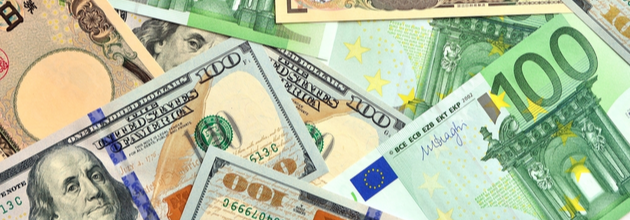 | Read in Browser |
 |
 |
| | Top News  Shutterstock Monetary policy has been front and center over the last few months amid questions about how economic trends coming out of the pandemic will influence the world's most important central banks. Chief among them is inflation concerns, though other figures like industrial production and retail sales have also been big talking points. Lockdowns are not helping, with Germany following Austria's lead in shuttering places where hospitals are overwhelmed as surging COVID cases spread across the continent.
Bigger picture: Traders are betting that the ECB will stick to its loose monetary policy despite the Federal Reserve and Bank of England indicating that they are going to raise rates to counter inflation. The U.S. economy has also surprised on the upside this year, while recent European data has disappointed, such as Germany's latest industrial production and factory orders figures. "At a time when purchasing power is already being squeezed by higher energy and fuel bills, an undue tightening of financing conditions is not desirable, and would represent an unwarranted headwind for the recovery," ECB President Christine Lagarde said earlier this week.
Meanwhile, a lot of the trading expectations have recently spilled over from the bond markets, to currency markets, with the euro falling sharply against the dollar. On Wednesday, the currency even fell to $1.13, and is still holding at that level, marking a low that was last seen 16 months ago. Against the pound, the euro is near levels not seen since the start of the pandemic and many traders are pricing in further near-term weakness.
Over in Japan: In another diverging trend, Tokyo is set to announce a record $490B spending package today (including direct cash payments) to cushion the economic blow from the pandemic. That bucks a recent stance adopted by the world's other systemically significant central banks, which have been withdrawing crisis-mode stimulus measures (like the recent tapering decision by the Fed). It will also pile on more liabilities to Japan's heavy debt load, which has reached 266% of its gross domestic product. | | Tech Talk on Apple's ( AAPL) car-development plans accelerated yesterday in a busy week for the EV sector. A report from Bloomberg suggested the company is now targeting a fully self-driving electric car launch in 2025, faster than the five- to seven-year timeline that some engineers had expected as recently as earlier this year. The ideal design for the car would feature no steering wheel or pedals, and in at least one mockup, passengers would face inward, toward each other. Shares of Apple closed up nearly 3% on Thursday at a new all-time high of $157.87. Snapshot: The general consensus on the initiative is that Apple will seek out a manufacturing partner. Wedbush Securities thinks a strategic alliance could be announced next year with Hyundai ( OTCPK:HYMTF), Volkswagen ( OTCPK:VLKAF) or others, while a partnership in China could include XPeng ( XPEV) or Nio ( NIO). In terms of hardware, Taiwan Semiconductor ( TSM) has been touted as a partner for autonomous chips, while Apple has held discussions on battery options with Contemporary Amperex Technology and BYD Company ( OTCPK:BYDDF). "When you stack Apple up against Tesla ( TSLA) in terms of tech prowess, I think that they are probably closer than you think to where Tesla's at today," said Loup Ventures analyst Gene Munster. "AI, which is really the substance of autonomy - on that front, they're doing really well. This is about as big an addressable market as you can get and Apple wants to be a participant." Getting serious about the future: Given the coming competition, more automakers are planning their next industry steps. On Thursday, CEO Jim Farley said Ford ( F) plans to produce 600K EVs a year globally by the end of 2023, which is twice its original plan (think electric F150 Lightning, Mustang Mach-E and the planned electric Transit van). Ford and General Motors ( GM) are also looking to get into the semiconductor business, a year after chip shortages upended their global factory output. | | Sponsored By Invesco QQQ  For Investors looking for unique and differentiated options, consider becoming an agent of innovation with Invesco QQQ. Learn more. | | Economy The nonpartisan Congressional Budget Office is out with its estimate for President Biden's Build Back Better Act. The $1.75T social spending measure is the second installment of the administration's economic agenda after an infrastructure package passed earlier this week to update America's roads, tunnels and bridges. Democrats hoped to pass the bill in the House on Thursday night, but an hours-long speech by Minority Leader Kevin McCarthy prompted them to postpone the vote until this morning.
CBO analysis: The federal agency found that the Build Back Better Act would contribute $367B to the deficit over 10 years, though that doesn't include $207B in revenue which could result from spending $80B on tax enforcement efforts at the IRS. Adding in those potential gains, the bill's 10-year deficit still totals $160B. The new figures added fresh impetus for Republicans to unite against the bill, with McCarthy calling it, "the single most reckless and irresponsible spending in the history of this country."
On the other side of the aisle, the Biden administration said IRS spending would generate $480B (not $207B stated by the CBO), and would even reduce the total deficit by $112B over the next decade. That would mean the bill would be a net positive for the national debt and many Democrats appear willing to accept that perspective. Complicated matters is the support from centrists like Sen. Joe Manchin, who has flagged its hefty price tag, and only time will tell how things will play out. Democrats hope to pass the bill via a special legislative process called reconciliation, meaning the entire support of the party's members would be needed in the evenly divided Senate.
What's in the bill? Universal prekindergarten, capping child care expenses, negotiating lower prescription drug costs and expanding tax credits for reducing carbon emissions. It would also impose a new 15% minimum tax on large U.S.-based corporations, create a 1% tax on stock buybacks and raise taxes on U.S. companies' foreign profits. However, the bill would leave the corporate tax rate at 21% after pressure from Sen. Kyrsten Sinema, while basic individual tax rates would stay unchanged for all but top earners. | | Consumer Walmart ( WMT) has launched a new delivery service using autonomous drones after toying around with the technology for more than six years. Under a partnership with California-based Zipline, the nation's largest retailer will be able to transport health and wellness products to its customers around Pea Ridge, Arkansas, who will use the Zipline app to place their orders. At full capacity, Zipline's aircraft can service a 50-mile radius (nearly the size of the state of Connecticut) and Walmart hopes the platform can eventually make its products more widely accessible in the U.S. Backdrop: Zipline began operating in 2016 and has completed over 200K commercial deliveries of over 4.5M units of medical supplies, serving more than 20M people across multiple countries. After staffers pack the delivery into the underbelly of a drone, the aircraft takes off on a launchpad and eventually drops the box (tethered to a mini-parachute) into a customer's back or front yard. Walmart expects the deliveries to take 30 to 45 minutes. "Drones can help break down barriers to on-demand access by reaching historically difficult delivery locations, such as rural communities," according to a spokeswoman. Note: Walmart has been testing other initiatives to turn its last mile delivery services autonomous, including using driverless trucks to deliver goods between locations. | | Today's Markets In Asia, Japan +0.5%. Hong Kong -1.1%. China +1.1%. India closed.
In Europe, at midday, London -0.6%. Paris -0.6%. Frankfurt -0.3%.
Futures at 6:20, Dow -0.5%. S&P -0.3%. Nasdaq +0.3%. Crude -3.1% at $75.96. Gold +0.1% at $1863.60. Bitcoin -3.8% at $56954.
Ten-year Treasury Yield -5 bps to 1.53%
Today's Economic Calendar | | | | | | | | Seeking Alpha's Wall Street Breakfast Podcast Seeking Alpha's Wall Street Breakfast podcast brings you all the news you need to know for your market day. Released by 8:00 AM ET each morning, it is a quick listen that you can put on as you get ready to start your working day. | | | | |











EmoticonEmoticon